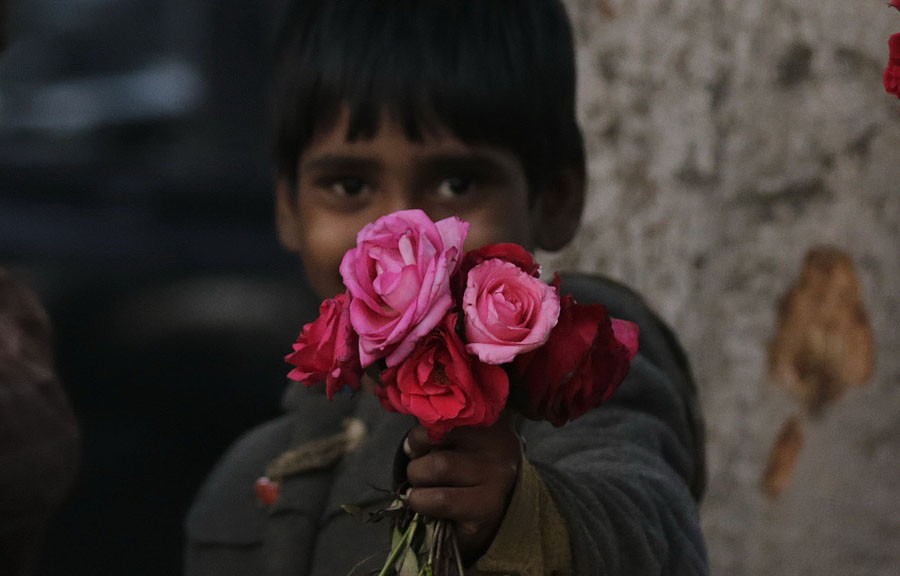
What is with these senseless bans because of which we have started to perceive the celebration of Valentine’s Day as some sort of radical act?

The pushback began around 2014. Right from the start, the conservatives at least tried to be creative in their attempt to deflate Valentine’s Day. Meaning that instead of just cancelling the day, they battled it by offering something in return: Haya Day. By suggesting that we celebrate Modesty Day instead of Valentine’s Day, the message was clear: Valentine’s Day is vulgar, immodest, and anti-Pakistani culture.
Soon, they won institutional support: in 2016, former president Mamnoon Hussain said that instead of Western culture, we should promote Islamic culture. Things grew more intense the next year, when the Islamabad High Court banned PEMRA from promoting Valentine’s Day on television. In 2018, wanting to put their heads further into sand - the court also banned any signs about the Day from public spaces.
But 2019 has been, by far, the most interesting. It seems the seeds sown by institutional authorities, including students’ political parties in public universities, have finally begun to reap and bloom amongst individuals who are now personally taking anti-Valentine’s Day initiatives.
Like institutions that were offering us lukewarm replacements of Valentine’s Day, these individuals are also placating allegedly Valentine-desperate Pakistanis with Islam-friendly alternatives.
Take for instance, one Mr Noman on YouTube detailing the various ways in which we, as Pakistanis, could celebrate Valentine’s Day. Rule number one, don’t call it Valentine’s Day, call it ‘Love Day’. He doesn’t explicitly explain why, but hints at how the day’s Christian history threatens him and his religiosity. Rule number 2, if you are married, make sure you are either a husband or a housewife, no third kind of married person should exist, according to him. Since I am neither, I will jump to the next few rules.
This is where things get really desi. Brothers, wanting to express love for their sisters, are recommended to do things for sisters that need them to step outside the house (because god forbid, women step outdoors). Loving daughters should take over the kitchen from their mothers. Sons should offer massages to their fathers. Lastly, Love Day can also prove useful for soured friendships to be sweetened. There is, of course, no mention of romantic love outside of marriage.
I doubt former President Asif Ali Zardari ever heard of a certain Mr Noman, but the PPPleader did follow through the vlogger’s suggestion of dedicating Valentine’s Day to your family. Bakhatawar, Bilawal and Aseefa received a huge, beautiful bouquet of red roses from their father, which the elder daughter instagrammed.
Is this what it means to assimilate ‘Western culture’ into ours?
Next in line for a more botched assimilation, we have Faisalabad’s University of Agriculture which decided to up the ante by arranging a ‘Sisters Day’ on Feb 14. The main highlight? Male students were encouraged to gift veils, gowns and scarves to female students. The VC himself began the day by symbolically placing scarves on several female students. Essentially, this is an extension of the 2014 Haya Day; a replacement of ‘vulgarity’ and romantic love with ‘modesty’. But really, if modesty is what the VC is trying to promote, maybe next year he should hand out eye masks to all the men, starting from himself. It makes almost exactly as much sense as him cloaking and covering women.
Frankly, no one, apart from students who don’t have midterms, quizzes, submissions and projects, really has time for Valentine’s Day. To most people, it’s a day like any other.
This ever-romantic Valentine’s Day a school principal in a town near Lahore was booked for blackmailing his female staff. He had photos of the teacher that he was threatening to share on social media. Also on Valentine’s Day, a man near Lahore was given death penalty for murdering his wife. His motivation was the suspicion that she was in a relationship with someone else. And also on Valentine’s Day, the post-mortem report of a minor boy from Lahore was released. It is suspected that he was beaten to death by his Qari Sahab.
So really, it was like most other days.
Of course, there were Valentine’s Day sales and gift vouchers, but we have those now for almost anything. If we can commodify the four seasons, Independence Day, Mother’s Day and Eid then why are Valentine’s Day sales so terrifying? One reason may be that Pakistanis, even as they date and have sex, can’t help but be in denial about dating and sex. Hence the idea of romance scares us.
Careem Pakistan’s campaign for Valentine’s Day works into this idea of fearing the day and what it’s meant to represent. This year they celebrated Valentine’s Day, without actually saying the word Valentine, romance, or love. They asked users to send them their ‘favourite persons’ details and this favourite person would get a free voucher. I’m not saying corporations should be commodifying love in this way, but just next door, Uber India celebrated V Day with ‘pride’. Their queer demand for a rainbow heart emoji was courageous, inclusive and I have to admit, cute. And, much like we are striving to do, it was indigenous given that it was the first Valentine’s Day since the decriminalisation of Section 377.
While the western world is fighting the now-commercial experience of Valentine’s Day and disparaging how neoliberalism is playing a part in our intimate lives, because of these senseless bans we perceive the celebration of Valentine’s Day as some sort of radical act. Maybe we don’t need to be celebrating something Christianity and Chaucer came up with centuries ago, but we also don’t need to be afraid of it, because fear will only take us backwards.